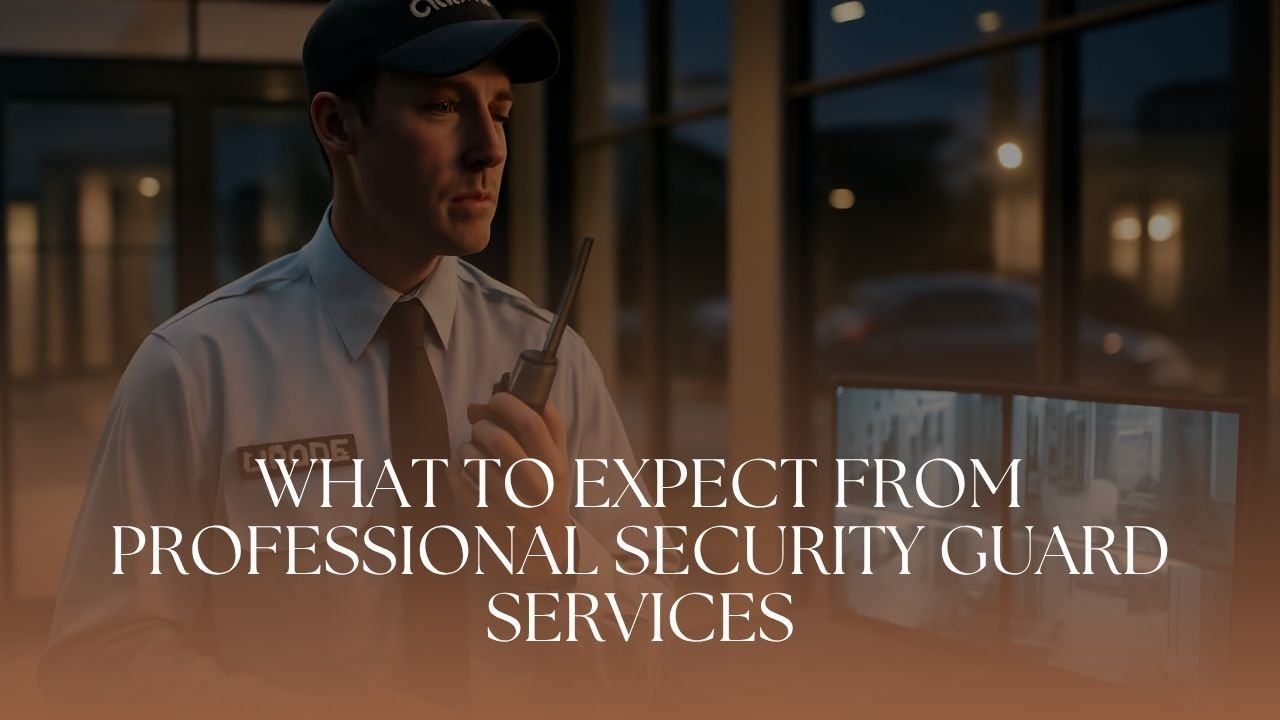In today’s unpredictable world, safety has become a serious concern for businesses, residential complexes, and public institutions alike.
Whether it’s protecting assets, controlling access, or ensuring smooth crowd management, professional security guard services have become an integral part of maintaining peace and stability.
However, many business owners and property managers are unsure what to expect when hiring a security provider.
Some assume it’s just about hiring guards to stand at entrances, but true professional security goes far beyond physical presence. It involves strategy, planning, technology integration, and strict compliance with regulations.
This comprehensive guide explains everything you need to know about professional security guard services — what they include, how they operate, the standards they follow, and how you can evaluate a reliable provider.
By the end, you’ll know exactly what to expect when you invest in professional protection.
Why Businesses and Homeowners Need Professional Security Guard Services
1. Visible Deterrence
A trained, uniformed guard acts as a strong visual deterrent. Their mere presence discourages theft, vandalism, and unauthorized access. Criminals are far less likely to target locations where professional guards are stationed.
2. Trained Emergency Response
Unlike untrained staff or volunteers, professional guards know how to respond calmly during emergencies — from medical incidents and fires to active security threats.
Their ability to assess, react, and coordinate can save lives and minimize damage.
3. Enhanced Safety and Order
Security guards maintain order in public gatherings, offices, and industrial areas. They ensure visitors follow rules, handle conflicts diplomatically, and reduce the risk of escalation.
4. Liability Protection
Professional firms carry insurance and operate under strict compliance laws. This reduces your legal liability in case of incidents or injuries on the premises.
5. Peace of Mind
Knowing that experts are handling security allows owners and employees to focus on operations. Peace of mind is one of the biggest returns on security investment.
Core Components of Professional Security Guard Services
Professional security firms typically offer a wide range of services, each customized to the client’s environment, risk level, and operational needs. The table below outlines what a standard service package should include.
| Component | Meaning | What You Should Expect |
|---|---|---|
| Risk Assessment | Initial site analysis identifying weak points and threats | A written report with recommended measures before service starts |
| Staffing & Deployment | Placement of armed/unarmed guards or patrol units | Guards matched to your environment and threat level |
| Patrolling (Foot/Vehicle) | Regular area monitoring to ensure safety | Documented routes, electronic verification, surprise checks |
| Access Control | Managing entry points, IDs, visitor badges | Strict tracking of entries and exits |
| Incident Reporting | Detailed documentation of incidents | Daily logs, alert reports, and follow-up procedures |
| Emergency Management | Fire, evacuation, or medical response | Regular drills, clear communication channels |
| Surveillance Integration | Use of cameras, alarms, and sensors | Guards trained to monitor and respond to system alerts |
| Training & Supervision | Ongoing skill upgrades and inspections | Continuous education, performance audits |
| Client Communication | Feedback, performance review, and coordination | Scheduled meetings, open reporting system |
| Accountability Tools | GPS, mobile patrol apps, time-tracking | Proof of performance through digital systems |
These elements define a modern, professional security guard service that goes beyond traditional static guarding.
Stages of a Professional Security Service
1. Site Evaluation and Planning
Every engagement begins with a security risk assessment. The provider inspects entry points, lighting, surveillance coverage, and surrounding crime trends.
Based on this, they propose staffing numbers, shift timings, patrol frequency, and emergency protocols.
2. Staff Recruitment and Training
Guards undergo background checks, criminal record screenings, and drug testing. Professional firms provide certified training in observation, de-escalation, emergency handling, first aid, and customer service.
In some cases, specialized training like handling hazardous materials or VIP protection is also included.
3. Deployment and Operations
After planning and training, guards are deployed according to the site’s schedule.
They maintain shift logs, record patrols using digital systems, and communicate through radios or mobile applications. Supervisors perform random inspections to ensure compliance.
4. Communication and Reporting
Effective communication separates amateur providers from professionals.
Expect real-time communication channels for urgent alerts, daily or weekly reports, and direct access to the site supervisor for feedback and updates.
5. Performance Monitoring
The best security providers track performance metrics (KPIs) such as incident response time, guard attendance, and inspection frequency.
These reports are reviewed with clients during scheduled meetings.
Types of Security Guard Services
1. Unarmed Security Guards
Perfect for retail stores, offices, and residential complexes, unarmed guards focus on observation, access control, and reporting. They rely on vigilance and communication rather than weapons.
2. Armed Security Guards
Used for high-risk areas such as banks, government facilities, or industrial zones. Armed guards undergo advanced firearms and tactical training. Strict licensing and background checks are required.
3. Mobile Patrol Units
These guards conduct regular patrols across larger areas or multiple sites, ensuring wider coverage. They use vehicles, GPS tracking, and time-stamped reports to verify rounds.
4. Event Security
Large events like concerts or sports matches require crowd management, entry screening, and conflict prevention. Event security ensures safety without disrupting the experience.
5. Executive and Personal Protection
Also known as bodyguard services, these professionals protect individuals from personal threats, escort them safely, and coordinate with law enforcement when required.
6. Industrial and Construction Security
These guards prevent theft of materials, monitor heavy equipment, and ensure compliance with safety protocols on work sites.
Training and Certification: The Backbone of Professionalism
Training defines the quality of security guards. Reputable providers ensure their personnel are certified in:
- Observation and Patrol Skills: Learning to spot suspicious activity quickly.
- Conflict Resolution and De-escalation: Handling tense situations calmly.
- First Aid and CPR: Immediate medical assistance in emergencies.
- Fire Safety: Evacuation planning and use of extinguishers.
- Communication Protocols: Clear radio or mobile reporting.
- Legal Awareness: Understanding laws about trespassing, detention, and self-defense.
Regular re-training ensures guards stay sharp and compliant with evolving regulations. Some states require annual refresher courses and testing before license renewal.
Supervision, Accountability, and Technology Integration
A key expectation from a modern security service is accountability. Guards should not only be present but verifiably active.
1. Supervision
Every site is overseen by a security supervisor who checks uniforms, punctuality, and professionalism. Unannounced inspections maintain quality control.
2. Technology Tools
Top companies use advanced monitoring systems:
- GPS tracking of patrol routes
- Guard tour verification systems using QR codes or RFID tags
- Real-time reporting apps for incident photos and notes
- Video integration with control rooms
These technologies ensure transparency, reduce errors, and provide measurable proof of service delivery.
3. Data-Driven Improvements
Collected data helps identify weak points, improve patrol schedules, and reduce incidents over time. Clients can review monthly or quarterly reports for insights.
Standards and Regulations
Every professional security firm must follow state or federal guidelines, such as licensing, training hours, and insurance coverage. Expect your provider to:
- Hold valid business and guard licenses.
- Provide proof of insurance (liability and workers’ compensation).
- Follow equal opportunity employment and safety rules.
- Maintain confidentiality of sensitive client data.
- Comply with OSHA workplace safety standards.
In addition, firms often adopt voluntary quality benchmarks like ISO standards, internal audits, and client satisfaction metrics.
Challenges and Limitations to Understand
While professional security services are essential, it’s important to have realistic expectations.
- No service can guarantee zero crime. Security aims to deter and respond, not eliminate all risk.
- Guards must act within legal limits. They can detain but not arrest like police.
- Turnover is common due to long hours or stress; consistent supervision prevents lapses.
- Technology requires investment. Modern systems raise costs but also accountability.
- False alarms or misunderstandings can occur, requiring ongoing coordination.
Understanding these limitations helps build a balanced partnership with your provider.
How to Evaluate and Choose the Right Security Company
1. Research and Compare
Study multiple companies, read client testimonials, and verify license numbers. Prioritize firms with long-term clients and proven reliability.
2. Review the Proposal
The proposal should include:
- Number of guards per shift
- Patrol coverage and timing
- Equipment and communication tools
- Emergency response plan
- Training and reporting details
3. Request for References
Speak to current clients about their satisfaction level, guard behavior, and response during emergencies.
4. Inspect Training and Documentation
Ask for training certificates, policy manuals, and insurance proofs. Transparency is a sign of professionalism.
5. Evaluate Communication and Flexibility
Reliable firms provide 24/7 communication lines and adapt quickly to client needs, emergencies, or site changes.
6. Monitor Performance After Hiring
After signing the contract, assess consistency, punctuality, and communication. Conduct periodic reviews and ask for measurable reports.
The Human Side of Security: Professionalism and Ethics
Security guards are not just enforcers — they’re ambassadors of safety and trust. Their attitude, courtesy, and communication shape how people perceive your organization.
Professionalism includes:
- Wearing clean uniforms and proper identification
- Maintaining respectful conduct with visitors and employees
- Staying alert during long hours
- Avoiding distractions like phones or casual talk on duty
- Maintaining confidentiality about site operations
Ethical behavior builds trust and prevents internal risks such as data leaks or collusion.
Cost Expectations and Budget Planning
Pricing depends on multiple factors:
- Type of guards (armed/unarmed)
- Number of hours and shifts
- Level of risk and required equipment
- Location and travel costs
- Technology integration (surveillance, tracking apps)
Average professional security costs in the U.S. range between $25 and $60 per hour per guard. While cheaper options exist, cutting corners on security can lead to greater long-term losses. Always balance quality with affordability.
Building a Long-Term Partnership
Security is not a one-time transaction — it’s an ongoing partnership. The best relationships between clients and providers are built on communication, accountability, and adaptability.
Schedule regular review meetings to discuss:
- Incident patterns and response improvements
- Staffing changes or additional coverage
- Upgrades in surveillance or alarm systems
- Employee feedback about guard performance
A proactive, cooperative approach ensures evolving protection aligned with your business growth and environmental changes.
Key Takeaways and Expectations
- Expect a detailed site evaluation before deployment.
- Guards must be trained, licensed, and insured.
- Reporting, supervision, and communication are non-negotiable.
- Technology integration improves accountability.
- Periodic reviews and data-driven insights ensure continuous improvement.
Professional security guard services protect more than property — they protect your reputation, people, and peace of mind.
Choosing the right professional security guard service is one of the most important decisions for any organization.
It defines how safe your people feel, how smoothly your operations run, and how well your assets are protected.
A high-quality provider offers far more than physical presence — they bring structure, communication, compliance, and reliability.
From risk assessment and training to incident reporting and ongoing reviews, each step matters.
When hiring, focus on transparency, accountability, and cultural fit. Ask detailed questions, review contracts carefully, and stay involved throughout the partnership.
With the right expectations, clear communication, and strong collaboration, professional security guard services can deliver not just protection, but confidence and continuity in an uncertain world.
FAQs
How are professional security guards trained?
Professional security guards undergo background checks and structured training in observation, communication, first aid, conflict management, and emergency procedures. Many states require annual refresher courses and practical re-certifications.
What is the difference between unarmed and armed security?
Unarmed guards rely on vigilance and communication for general site safety, while armed guards are deployed in high-risk areas and undergo extensive firearm and safety training. The choice depends on the site’s threat level.
Can I customize security services for my property?
Yes. Professional providers tailor security plans to your facility’s needs, including staffing levels, patrol frequency, surveillance tools, and reporting systems. Every plan starts with a site assessment to match coverage to real risks.




